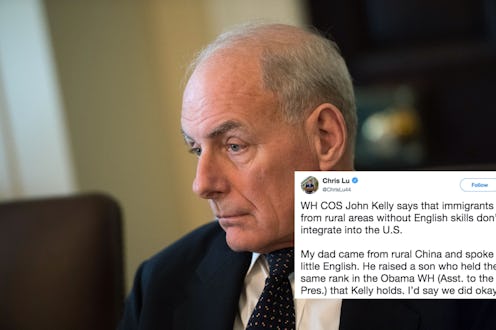News
John Kelly Trashed Migrant Families In A New Interview & Twitter Is Calling Racism

The White House's chief of staff came under fire Friday for his comments about immigrants from Latin America. In an interview with NPR, John Kelly criticized migrant families for reasons that many argue show an underlying bias and a standard of unfair expectations for any new group of immigrants.
"They don't integrate well. They don't have skills," Kelly told NPR. He acknowledged that "the vast majority of the people that move illegally into the United States are not bad people. They're not criminals." But Kelly went on to knock migrants on a number of supposed weaknesses — saying their lack of English speaking skills, their backgrounds from mostly from rural areas, and their generally lower educational levels mean they don't "easily assimilate into the United States."
Kelly's criticism came in response to a question about the Trump administration's new "zero tolerance" policy on illegal immigration that allows for the separation of families attempting to clandestinely enter the United States.
Twitter immediately erupted in opprobrium for Kelly, whose words echo arguments against allowing new immigrants into the country that have spanned generations. Atlantic writer James Fallows wrote, "People he’s describing = most of my own great-grandparents; all grandparents of my wife. This is an *American* story, not some 'alien' story."
A former administration official under President Obama, Chris Lu, wrote, "My dad came from rural China and spoke little English. He raised a son who held the same rank in the Obama WH (Asst. to the Pres.) that Kelly holds. I’d say we did okay."
Journalist Jennifer Mendelsohn made a similar point, tweeting that her Latvian grandparents were "an illiterate homemaker" and a shoemaker who both spoke no English. "My brothers have PhDs from Princeton and Stanford. See how that works, John Kelly?" Mendelsohn asked, accompanying her tweet with a screenshot of immigration records of her grandparents' arrival in the United States.
Author Joshua Zeitz pointed out, "Word for word, this is in line with how nativists described John Kelly’s Irish ancestors, who were overwhelmingly rural and thought to be ill-suited to the rhythms and discipline of an urbanizing, industrial econony [SIC]." Historian and author Kevin M. Kruse backed up Zeitz's claim by tweeting a political cartoon from 1871 full of racist innuendos about the Irish people, accompanied by an Irishman with what appears to be the face of a monkey. The racist trope was not an American invention. As the Irish Times outlines, the use of apes to depict Irish people has a long and bloody history in England. Kruse commented, "Someone should tell John Kelly how his Irish ancestors were once seen."
Kelly also came up for critique from the group Vote Vets, a self-described "progressive" organization that works to elect veterans to political office. The group tweeted, "Of ALL PEOPLE, John Kelly should know that immigrants 'assimilate' just fine," and then declared that the "military has always relied on patriotic immigrants, and for good reason -- they are among the finest troops we have." It's Kelly's long career in the military — nearly uninterrupted from 1970 to 2012 — that Vote Vets sees as evidence that the current WH chief of staff has no excuse to underestimate what immigrants can and do contribute.
Slate's chief political correspondent Jamelle Bouie offered his take on how to simplify things for everyone. "John Kelly would have saved himself a lot of words if he just said 'they aren’t white,'" Bouie wrote.
Kelly even earned chastisement from a Jesuit priest. James Martin, who also works as editor at large for America Magazine, wrote that "every hateful, stereotypical and racist" description Kelly used for Latin American immigrants "was said about every other immigrant group," including "his (and my) Irish ancestors. #IrishNeedNotApply."
It's unlikely Kelly knew his comments about immigrants would incite such an online backlash. But given how Kelly's words parrot those from anti-immigrant campaigns of America's past, it's little wonder they provoked an uproar.